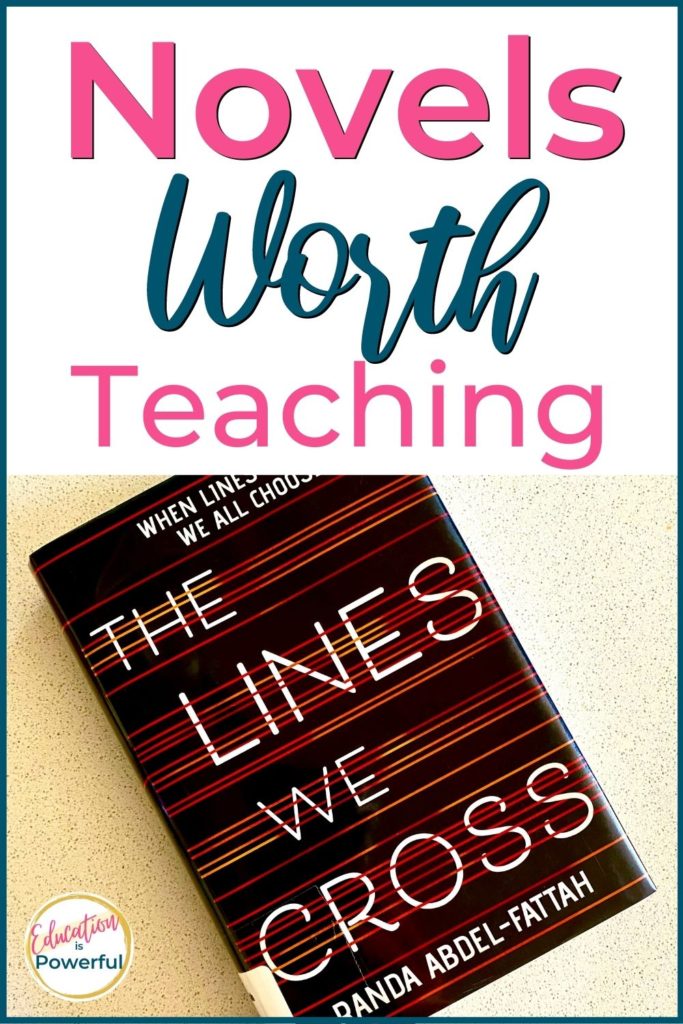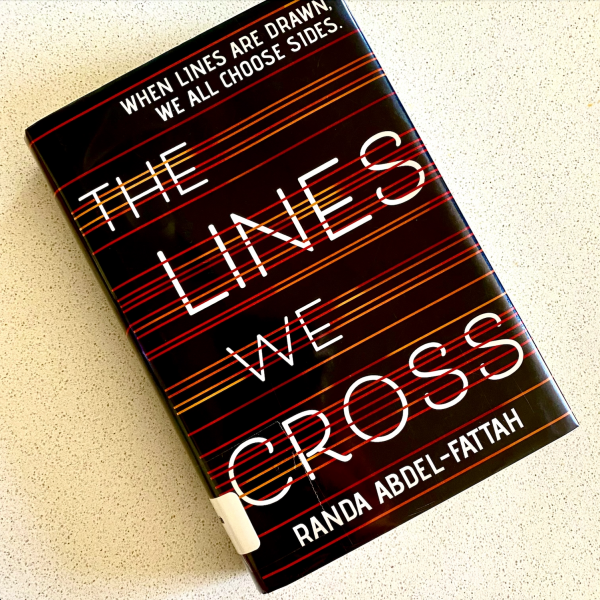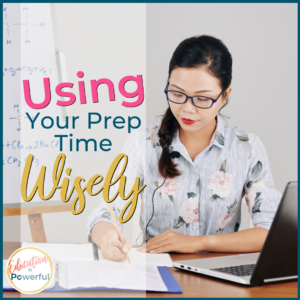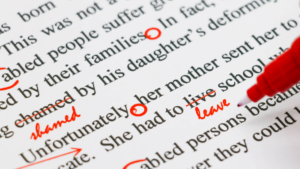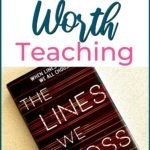For my first book in my diverse book reading series, I read The Lines We Cross by Randa Abdel-Fatah, this novel was interesting and the ending was perfect, and not the ending I thought it was going to have.
I do recommend listening to this through Audible or a book on CD through your local library because it is a novel in two voices.
The Lines We Cross Summary
The Lines We Cross takes place in Australia and is about two teenagers, one named Michael one named Mina.
Michael is popular, and his father is a founding member of a group called Aussie Values, which is, in its most basic, form an anti-immigration group. From the moment he sees Mina, he thinks she is beautiful and is intrigued by her.
Mina is a refugee from Afghanistan, who gets a scholarship to be able to go to the same high school as Michael, where she hopes to then be able to go on to college. Mina’s first impression of Michael is that he is racist and she doesn’t want anything to do with him.
The Evolution of Michael’s Beliefs
In the beginning, Michael’s views towards immigration are a mirror of his own parents. And in one scene he describes his beliefs like this, “I wear my political beliefs, like hand me down clothes.” That is incredible. I think to explain how most children have their beliefs. They are from their parents, and they don’t know any different until they experience a different world or a different life.
By small inches and degrees, Michael starts to see the problems with his parents’ and his friends’ beliefs. Michael has to stand up to his parents and his friends for things they say and things they do. But it happens so slowly that it feels realistic. People don’t change overnight simply because they meet one person.
The Role of Social Media and the Messages We Purposefully or Inadvertently Send
As Michael meets Mina, she doesn’t like him at first. She thinks that he is just like what he has on his Facebook page and his social media. So it’s really interesting that as Michael is trying to support his parents in this group that they’re in, he also is projecting to the world that he believes that but he just doesn’t know what he really does believe.
In The Lines We Cross, we learn that how you’re perceived can become the truth. So, we see it on a huge scale in this book with the way that they’re portraying refugees and immigration. The way Michael’s parents are portrayed is that they are calm and educated. Their arguments seem logical and researched, not based on racism or hatred. But there is a dark side to the group they belong to. What is put on their Aussie Values Facebook page is everything negative and wrong. But Michael’s parents simply ignore it and argue that it isn’t what they believe. Yet, they don’t condemn what is written or said.
Now Michael is immediately attracted to Mina, and he continually tries to get to know her, and it isn’t until he changes that outward perception that he has that Mina starts to soften towards him and give him a chance. So Michael has to kind of clean up his social media, and he has to go to the part of town where there’s a large Muslim population and learn about them before she gives him a chance, and it’s really his experiences that Michael also realizes that his parents aren’t right in their belief.
Subtle Racism and Prejudice
What I really liked about The Lines We Cross is that you don’t immediately think badly of Michael or his parents. Now that’s going to sound strange but hear me out. His parents are very educated, they’re calm. They’re patient, their arguments don’t center on not allowing any immigration, but on the belief that those who immigrate to Australia need to assimilate to Australian culture, and not continue their old ways or the culture of the countries that they came from.
It’s interesting how in these scenes where they’re doing television interviews and newspaper interviews. They sound so logical. I think we have this idea in our country that those who are against immigration must be uneducated and this book, completely disavows that.
But it doesn’t ever argue that this view of immigration is right or wrong. We see the argument through the perspective of our two main characters – Mina who is completely against it and Michael who is slowly learning that he doesn’t agree with his parents’ political agendas.
The Power of Political Debate
Too often we see those who have the opposite view of us as being neanderthals who clearly don’t have their own thoughts. Hillary Clinton is known for calling Trump Supporters – Deplorables. This attitude is false and what The Lines We Cross does is force us, as readers, to decide if we can see through the seemingly logical arguments and opinions of Michael’s parents.
I think it is a good lesson for students. Not every racist is so blatant about their beliefs. And they play on our own biases.
I think it would be a really good talking point in a classroom to teach students how politicians argue something and sound intelligent, are calm, sound right, and yet they can still be completely wrong.
When I teach debate, the performance is just as important as an argument. I have watched students completely frazzled their opponent in a cross-examination (the part of the debate that shouldn’t be judged). I’ve seen teams use this as a tactic to completely fluster their opponents for the rest of the debate.
And in our modern world, we’re not reading arguments in newspapers as much as we are getting political debates from social media, video, the news, pictures, images – that is what people remember. We can see this with the Black Lives Matter movement. There were so many peaceful protests during that time. But I still have very conservative family members who point out a car getting burned or a business getting broken into as the defining images of the Black Lives Matter Protests. And that’s what they remember – those kinds of sensationalized images.
The Conclusion to The Lines We Cross (spoiler warning!)
So the big tension in the novel or the major conflict is really between Michael and his parents.
The event that precipitates Michael finally confronting his parents is the Afghani restaurant Mina’s family owns is vandalized. In the end, Michael tells his parents that while they may not have thrown a rock or graffitied the building, their actions and statements have encouraged others to act out on their racist beliefs.
Michael explains to his parents, “You guys just think I woke up one day and decided to rebel against you out of some teenage protest. I want you to know that’s not what happened. I’ve tried really hard to see your point of view. I’ve struggled to reject the things you believe in. But I’ve done my own research because in case you’ve forgotten, it’s the two of you who taught me never to accept things at face value.”
At the end of The Lines We Cross, Michael’s conflict with his parents is not resolved. I was expecting some sort of resolution but there isn’t one. And it’s so true to life. It’s true, that his parents basically feel betrayed. And they still disagree with Michael. And that’s okay.
In the very last scene with Michael’s family, Michael’s father says, “We’re not the first family to divide on politics. It shouldn’t split us apart.” And Michael’s mother says, “Well obviously I won’t let that home happen. We wouldn’t be much of a family otherwise, would we?”
And I think that’s kind of the perfect ending, especially for teenagers. Growing up in our society and this politically charged world that we live in right now, it’s nice that this novel teaches that it’s okay to not agree with your parents. It doesn’t mean that you’re not a family. It doesn’t mean that you don’t love them. It doesn’t mean that they don’t love you. It’s just that you disagree, and that you see it differently. And I think it’s exactly what our world needs right now.
How I Would Teach The Lines We Cross in Class
So I definitely think The Lines We Cross is a book worth reading in class. I would teach this with sophomores. It does have a lower Lexile Level – 690, but I think the topic is more appropriate for high school than middle school.
I would combine it with political articles on the topics of immigration and refugees, and show both sides of the story. I think it could easily work into debates, or a research essay or a presentation, a research presentation on the various topics.
Immigration is a complex issue that may seem like there is only one side, but there are many shades to the argument. You could build an entire debate unit or research unit around the topic of immigration. With non-fiction texts and narratives, you could teach the rhetorical triangle, hitting Logos, Ethos, and Pathos – too often we forget Pathos when we teach research and debate.
I would also use the novel as a narrative to get started teaching about these really tough political topics. I think what happens when we debate controversial issues is that we forget the personal side of things. And I think it’s important that, as we’re debating topics we don’t lose the personal connection to those topics.
Even if you decide not to teach The Lines We Cross, it is definitely worth a read.
Other Books Worth Reading
Shop this Post
*Contains affiliate links, so I do make a small commission if you purchase using this link. However, I only include links to the things I love, use in my own class, or books I have in my own classroom library.
